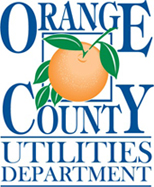Sarah Lux
407-864-6054
Sarah.Lux@ocfl.net
Local Water Partners Break Ground on Sewer Conversion Project to Save the Springs
~Key partners join forces to mediate pollution from hundreds of residential septic systems~
 Orange County, Fla. – Orange County Utilities (OCU) will begin a sewer retrofitting project next month to help protect the Wekiva River and Wekiwa Springs from an overabundance of nitrates. The plan, a partnership between the Orange County Board of County Commissioners, the Orange County Utilities Department, the St. Johns River Water Management District, and the Florida Department of Environmental Protection (FDEP), is expected to connect more than 2,000 homes to the county’s sewer lines during the next 15 years.
Orange County, Fla. – Orange County Utilities (OCU) will begin a sewer retrofitting project next month to help protect the Wekiva River and Wekiwa Springs from an overabundance of nitrates. The plan, a partnership between the Orange County Board of County Commissioners, the Orange County Utilities Department, the St. Johns River Water Management District, and the Florida Department of Environmental Protection (FDEP), is expected to connect more than 2,000 homes to the county’s sewer lines during the next 15 years.
Florida’s natural water resources, like Central Florida’s Wekiwa Springs, are sensitive to human activity. High concentrations of nitrates – attributed, in part, to fertilizers and septic tanks from neighborhoods in the immediate area – are negatively impacting the water quality and ecosystem of the springs.
“I’m proud to lead an agency so focused on protecting our natural resources,” Ed Torres, Director of Orange County Utilities said. “I can confidently say that Orange County is fully dedicated to providing sustainable services to our customers, and we simply couldn’t do that if our staff didn’t fully believe in that commitment.”
Septic tanks have been identified as the source of 29% of the nitrates in the springs. Retrofitting existing neighborhood septic systems to sewer is a way to aid the ailing springs by transmitting wastewater to an advanced treatment facility.
There are more than 50,000 septic systems in Lake, Orange, and Seminole counties impacting the Wekiwa Springs and the Wekiva River. To ensure the project is as environmentally impactful as possible, Orange County Utilities identified 17 neighborhoods within the county’s service jurisdiction that are in close proximity to several springs. Phases 1 and 2 of the conversion project will connect the four neighborhoods closest to Wekiwa Springs to central sewer service.
“I knew when I first took office that we had to work on septic-to-sewer conversions,” Commissioner Moore said. “In order to stop polluting our beautiful Orange County waters with nitrogen, residential septic systems have to be replaced. The conversion is well worth it, and I am grateful to our residents who are on board with the process, as well as Gov. Ron DeSantis, the state agencies, and our county for funding the beginning phases.”
Commissioner Moore has been a champion of the sewer conversion since the beginning. Moore has garnered attention for the project in Tallahassee and hosted several community meetings to educate homeowners on the issue. Many homeowners attended the meetings and asked questions about the process of transitioning from septic to sewer. Thanks to these meetings and other outreach efforts, the project received a high approval rate from homeowners in the area.
As a stakeholder of the project, Orange County Utilities is responsible for $2.52M (25%) of phase one costs. Committed to minimizing the construction costs for homeowners, Orange County secured up to 65% of the overall project costs from outside funding sources. As part of that goal, Orange County obtained outside funding assistance from the St. Johns River Water Management District ($1.5 million or 14.9%), Florida Department of Environmental Protection ($4.3 million or 42.6%), and from state budget appropriations ($500,000 or 5%).
About Orange County Government: Orange County Government strives to serve its residents and guests with integrity, honesty, fairness and professionalism. Located in Central Florida, Orange County includes 13 municipalities and is home to world-famous theme parks, one of the nation’s largest convention centers and a thriving life science research park. Seven elected members make up the Board of County Commissioners, including the Mayor, who is elected countywide. For more information, please visit www.OCFL.net or go to Orange County Government’s social media channels.
